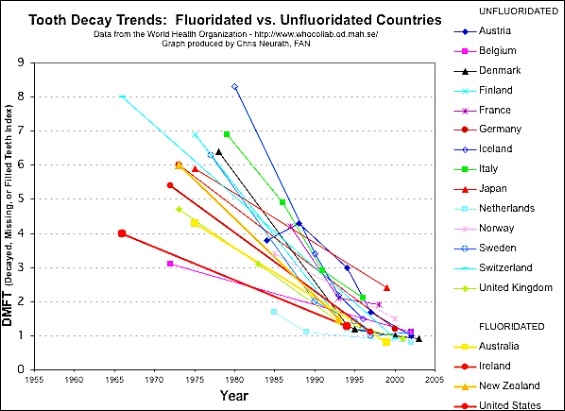Is Water Fluoridation Effective?
When we ask if water fluoridation is effective, we are asking: Do water districts with artificial water fluoridation have lower DMFT rates than economically and racially similar unfluoridated water districts? NOTE: DMFT = decayed, missing or filled teeth; DMFS=decayed, missing or filled surfaces.
The American Dental Association (ADA) asserts that water fluoridation is the single most effective public health measure to prevent tooth decay. The Centers for Disease Control and Prevention (CDC) has proclaimed community water fluoridation one of 10 great public health achievements of the 20th century.
Studies since the 1980s trend strongly in the opposite direction.
73% of U.S. Citizens on public water systems drink fluoridated tap water, more people than drink artificially fluoridated water in the rest of the world combined, yet, according to World Health Organization (WHO) statistics, countries that do not fluoridate have decay rates that mirror our own.
 2015: “Fluoridation May Not Prevent Cavities, Scientific Review Shows” (Douglas Main, Newsweek, 6/29/15), discusses the Cochrane Collaboration’s nuanced findings on the effectiveness of water fluoridation, and the reliability of early studies, in its review, “Water fluoridation for the prevention of Caries.” (Iheozor-Ejiofor, et al. 6/18/2015). Read the Abstract and Plain Language Summary. Access the full article.
2015: “Fluoridation May Not Prevent Cavities, Scientific Review Shows” (Douglas Main, Newsweek, 6/29/15), discusses the Cochrane Collaboration’s nuanced findings on the effectiveness of water fluoridation, and the reliability of early studies, in its review, “Water fluoridation for the prevention of Caries.” (Iheozor-Ejiofor, et al. 6/18/2015). Read the Abstract and Plain Language Summary. Access the full article.
[Article in progress]
Promoters of fluoridation, including public health officials and professional bodies, assert that “Water fluoridation is effective, fluoridation is cost effective, and fluoridation is safe.” Dr. Paul Connett recommends 10 Key Papers that Challenge Pro-Fluoridation Assertions.